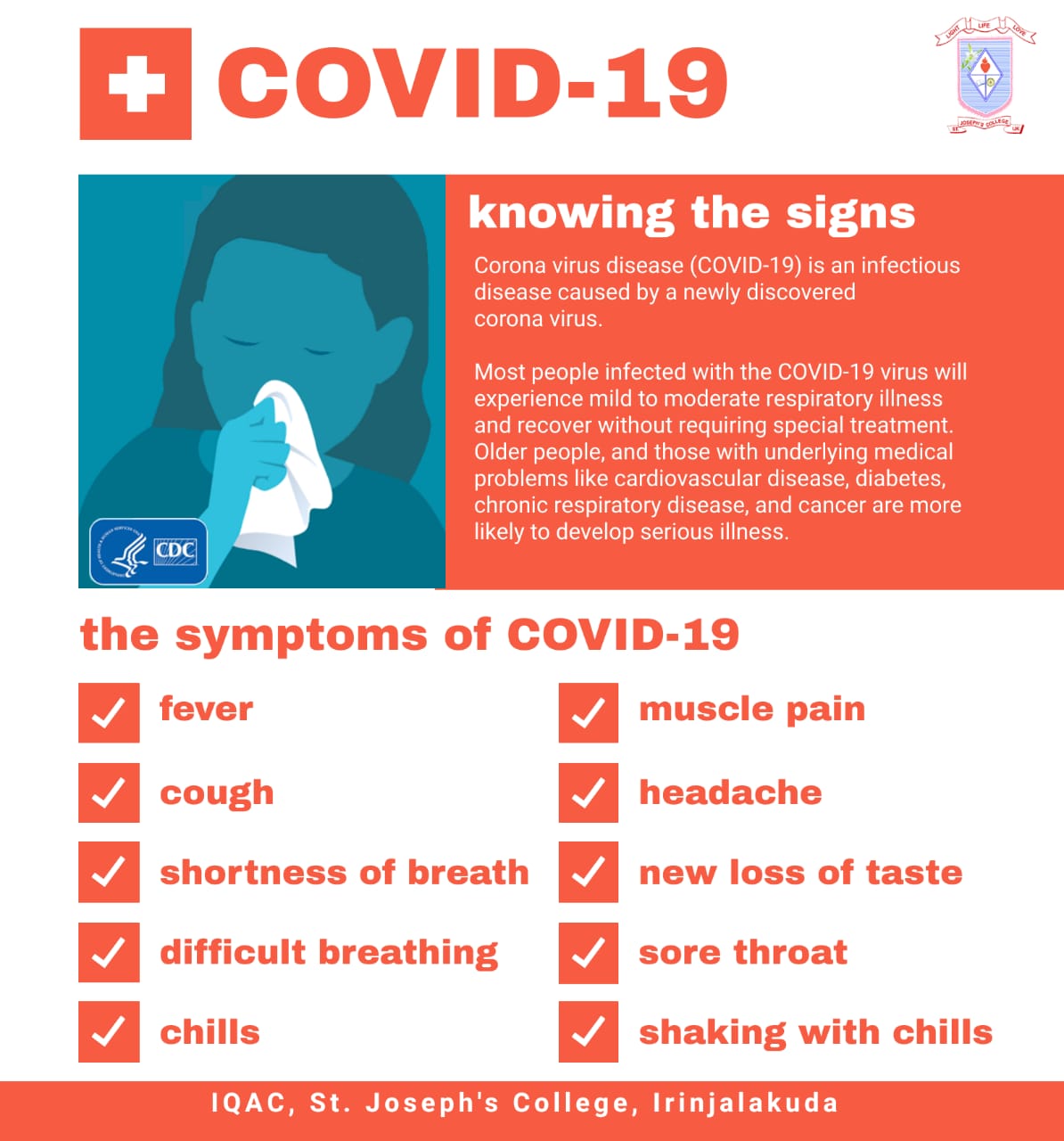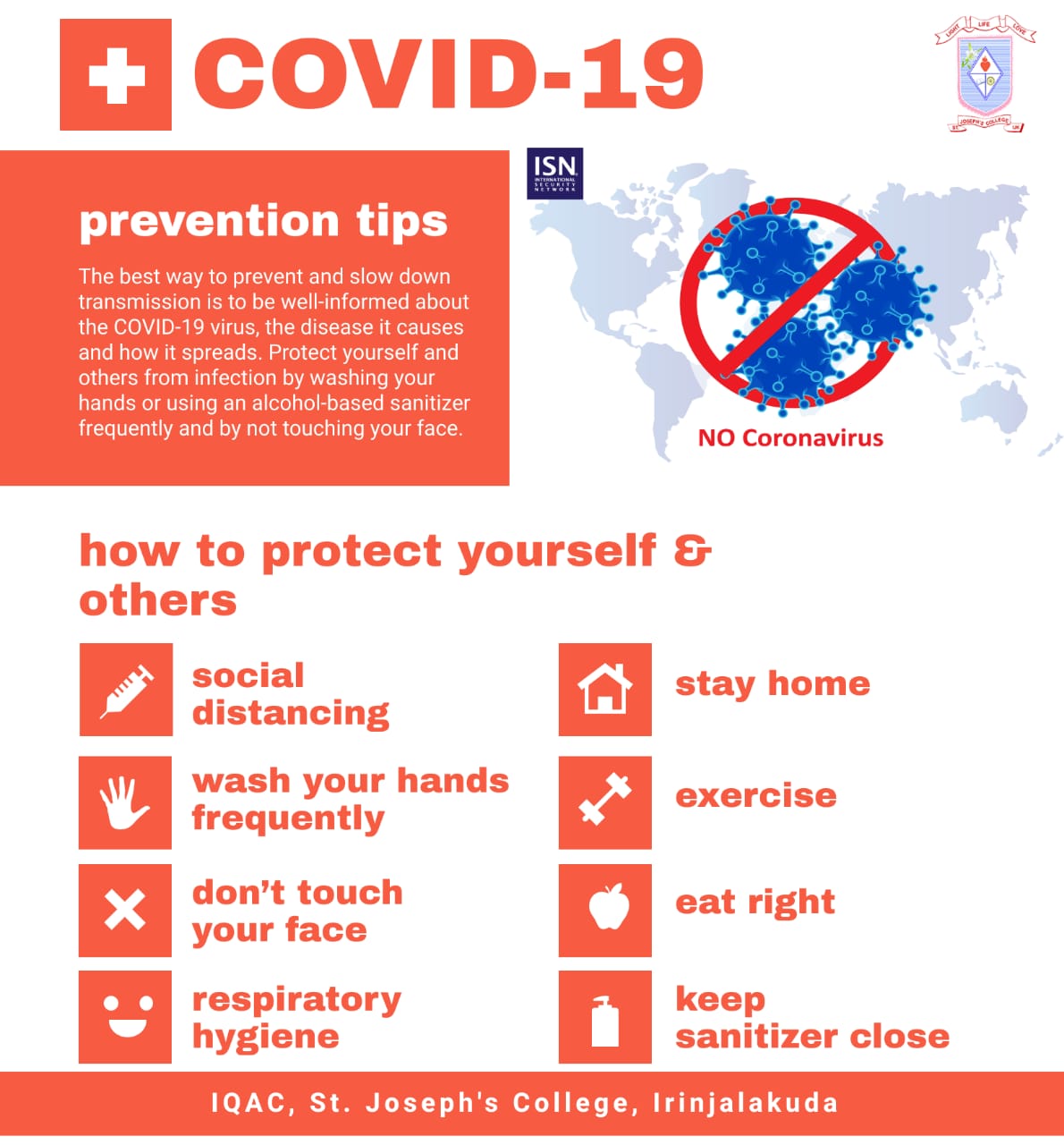St. Joseph’s College (Autonomous) Irinjalakuda, is takingpreventive measures due to COVID 19 outbreakin Kerala. Classes are suspended and Examinations are postponed for the academic year. Students and teachers are requested to use online platform forsmooth conduct of academic activities like Lectures, Class tests and assignments. Sanitizers and hand-wash liquids are prepared by Department of Chemistry and joined in thebreak the chain campaign of Kerala government and distributed to each and everydepartment with free of cost. Following are some guidelines and facts given by WHO . Students, faculty and staff are requested to follow the same.

|

|
Regularly and thoroughly clean your hands with an alcohol-based hand rub or wash them with soap and water.
Why? Washing your hands with soap and water or using alcohol-based hand rub kills viruses that may be on your hands.
Maintain at least 1 metre (3 feet) distance between yourself and anyone who is coughing or sneezing.
Why? When someone coughs or sneezes they spray small liquid droplets from their nose or mouth which may contain virus. If you are too close, you can breathe in the droplets, including the COVID-19 virus if the person coughing has the disease.
Why? Hands touch many surfaces and can pick up viruses. Once contaminated, hands can transfer the virus to your eyes, nose or mouth. From there, the virus can enter your body and can make you sick.
Make sure you, and the people around you, follow good respiratory hygiene. This means covering your mouth and nose with your bent elbow or tissue when you cough or sneeze. Then dispose of the used tissue immediately.
Why? Droplets spread virus. By following good respiratory hygiene you protect the people around you from viruses such as cold, flu and COVID-19.
Stay home if you feel unwell. If you have a fever, cough and difficulty breathing, seek medical attention and call in advance. Follow the directions of your local health authority.
Why? National and local authorities will have the most up to date information on the situation in your area. Calling in advance will allow your health care provider to quickly direct you to the right health facility. This will also protect you and help prevent spread of viruses and other infections.
Stay informed on the latest developments about COVID-19. Follow advice given by your healthcare provider, your national and local public health authority or your employer on how to protect yourself and others from COVID-19.
Why? National and local authorities will have the most up to date information on whether COVID-19 is spreading in your area. They are best placed to advise on what people in your area should be doing to protect themselves.
Home made Hand sanitizer - click here
Home made Face mask - click here
When to use a mask
From the evidenceso far, the COVID-19 virus can be transmitted in ALL AREAS, including areaswith hot and humid weather. Regardless of climate, adopt protective measures ifyou live in, or travel to an area reporting COVID-19. The best way to protectyourself against COVID-19 is by frequently cleaning your hands. By doing thisyou eliminate viruses that may be on your hands and avoid infection that couldoccur by then touching your eyes, mouth, and nose.
There is no reasonto believe that cold weather can kill the new coronavirus or other diseases.The normal human body temperature remains around 36.5°C to 37°C, regardless ofthe external temperature or weather. The most effective way to protect yourselfagainst the new coronavirus is by frequently cleaning your hands withalcohol-based hand rub or washing them with soap and water.
Taking a hot bathwill not prevent you from catching COVID-19. Your normal body temperatureremains around 36.5°C to 37°C, regardless of the temperature of your bath orshower. Actually, taking a hot bath with extremely hot water can be harmful, asit can burn you. The best way to protect yourself against COVID-19 is byfrequently cleaning your hands. By doing this you eliminate viruses that may beon your hands and avoid infection that could occur by then touching your eyes,mouth, and nose.
To date there hasbeen no information nor evidence to suggest that the new coronavirus could betransmitted by mosquitoes. The new coronavirus is a respiratory virus whichspreads primarily through droplets generated when an infected person coughs orsneezes, or through droplets of saliva or discharge from the nose. To protectyourself, clean your hands frequently with an alcohol-based hand rub or washthem with soap and water. Also, avoid close contact with anyone who is coughingand sneezing.
No. Hand dryers arenot effective in killing the 2019-nCoV. To protect yourself against the newcoronavirus, you should frequently clean your hands with an alcohol-based handrub or wash them with soap and water. Once your hands are cleaned, you shoulddry them thoroughly by using paper towels or a warm air dryer.
UV lamps should notbe used to sterilize hands or other areas of skin as UV radiation can cause skinirritation.
Thermal scannersare effective in detecting people who have developed a fever (i.e. have ahigher than normal body temperature) because of infection with the newcoronavirus.
However, theycannot detect people who are infected but are not yet sick with fever. This isbecause it takes between 2 and 10 days before people who are infected becomesick and develop a fever.
No. Sprayingalcohol or chlorine all over your body will not kill viruses that have alreadyentered your body. Spraying such substances can be harmful to clothes or mucousmembranes (i.e. eyes, mouth). Be aware that both alcohol and chlorine can beuseful to disinfect surfaces, but they need to be used under appropriaterecommendations.
Thermal scannersare effective in detecting people who have developed a fever (i.e. have ahigher than normal body temperature) because of infection with the newcoronavirus.
However, theycannot detect people who are infected but are not yet sick with fever. This isbecause it takes between 2 and 10 days before people who are infected becomesick and develop a fever.
No. Sprayingalcohol or chlorine all over your body will not kill viruses that have alreadyentered your body. Spraying such substances can be harmful to clothes or mucousmembranes (i.e. eyes, mouth). Be aware that both alcohol and chlorine can beuseful to disinfect surfaces, but they need to be used under appropriaterecommendations.
No. Vaccinesagainst pneumonia, such as pneumococcal vaccine and Haemophilus influenza typeB (Hib) vaccine, do not provide protection against the new coronavirus.
The virus is so newand different that it needs its own vaccine. Researchers are trying to developa vaccine against 2019-nCoV, and WHO is supporting their efforts.
Although thesevaccines are not effective against 2019-nCoV, vaccination against respiratoryillnesses is highly recommended to protect your health.
No. There is noevidence that regularly rinsing the nose with saline has protected people frominfection with the new coronavirus.
There is somelimited evidence that regularly rinsing nose with saline can help peoplerecover more quickly from the common cold. However, regularly rinsing the nosehas not been shown to prevent respiratory infections.
People of all agescan be infected by the new coronavirus (2019-nCoV). Older people, and peoplewith pre-existing medical conditions (such as asthma, diabetes, heart disease)appear to be more vulnerable to becoming severely ill with the virus.
WHO advises peopleof all ages to take steps to protect themselves from the virus, for example byfollowing good hand hygiene and good respiratory hygiene.
No, antibiotics donot work against viruses, only bacteria.
The new coronavirus(2019-nCoV) is a virus and, therefore, antibiotics should not be used as ameans of prevention or treatment.
However, if you arehospitalized for the 2019-nCoV, you may receive antibiotics because bacterialco-infection is possible.
Garlic is a healthy food that may have some antimicrobial properties.However, there is no evidence from the current outbreak that eating garlic hasprotected people from the new coronavirus.
Update your browser to view this website correctly.